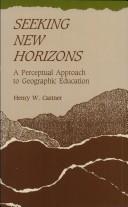| Listing 1 - 3 of 3 |
Sort by
|

ISBN: 0231073941 023107395X Year: 1990 Publisher: New York Columbia University Press
Abstract | Keywords | Export | Availability | Bookmark
 Loading...
Loading...Choose an application
- Reference Manager
- EndNote
- RefWorks (Direct export to RefWorks)
Environmental perception --- Environnement [Perception de l' ] --- Geografische waarnemingen --- Geographical perception --- Maps [Mental ] --- Perception de l'environnement --- Perception géographique --- Perceptual cartography --- Perceptual maps --- Représentation mentale de l'environnement --- Geographical perception. --- Human ecology --- Public opinion. --- Public opinion --- Human ecology - Public opinion.
Book
ISBN: 0300045107 Year: 1990 Publisher: New Haven (Conn.): Yale university
Abstract | Keywords | Export | Availability | Bookmark
 Loading...
Loading...Choose an application
- Reference Manager
- EndNote
- RefWorks (Direct export to RefWorks)
Geographical perception --- Landscape architecture --- Landscape assessment --- Regional planning --- Regional development --- State planning --- Human settlements --- Land use --- Planning --- City planning --- Landscape protection --- Assessment, Landscape --- Environmental perception --- Landscape evaluation --- Landscape perception --- Perception, Landscape --- Human ecology --- Horticultural service industry --- Landscape gardening --- Landscaping industry --- Maps, Mental --- Mental maps --- Perceptual cartography --- Perceptual maps --- Perception --- Orientation (Psychology) --- Space perception --- Government policy --- Geographical perception. --- Landscape architecture. --- Landscape assessment. --- Regional planning.

ISBN: 1282851497 9786612851490 0773562257 9780773562257 0773507280 9780773507289 Year: 1990 Publisher: Montreal ; Buffalo : McGill-Queen's University Press,
Abstract | Keywords | Export | Availability | Bookmark
 Loading...
Loading...Choose an application
- Reference Manager
- EndNote
- RefWorks (Direct export to RefWorks)
Castner developed this innovative perspective on geographic education through observation of the Orff-Schulwerk technique of music education. This pedagogical method provides an organizational framework within which the primitive elements and concepts of music can be introduced, experienced, and explored, and auditory discrimination developed. The process of improvisation is the focal point of the Schulwerk. Castner suggests that the numerous educational benefits of improvisation can be obtained in geographic education by the process of "mapping." He defines mapping as graphic description, analysis, and presentation in a problem-solving context. After more than two decades of research in cartographic communication, Castner concludes that success in examining and analysing landscapes, and images representative of them, is dependant upon developed skills in visual discrimination. Seeking New Horizons describes a rationale for linking basic visual discriminations to their logical extensions in the concepts that are fundamental to geographic thinking, thus providing challenging approaches to developing spatial awareness, graphic literacy, and geographic understanding. In addition, Castner identifies eight basic concepts which would allow students and teachers to work interactively with spatial information and, over time, with increasingly complex and sophisticated tools and at increasingly abstract levels of generalization.
Geography --- Visual perception. --- Cartography --- Cartography, Primitive --- Chartography --- Map-making --- Mapmaking --- Mapping (Cartography) --- Mathematical geography --- Surveying --- Map projection --- Maps --- Area studies --- Optics, Psychological --- Vision --- Perception --- Visual discrimination --- Study and teaching. --- Psychological aspects --- Geographical perception. --- Environmental perception --- Maps, Mental --- Mental maps --- Perceptual cartography --- Perceptual maps --- Orientation (Psychology) --- Space perception
| Listing 1 - 3 of 3 |
Sort by
|

 Search
Search Feedback
Feedback About
About Help
Help News
News